Overview
Everyone who owns Bitcoin and “stores” them in a Bitcoin wallet is a part of a decentralized network. This blog post will explore what a Bitcoin wallet is, its essential parts you need to know, and broaden your understanding of Bitcoin in general.
Bitcoin is the most easily recognizable application of the blockchain technology. It is a “decentralized peer-to-peer” made possible with blockchain technology. Knowing about Bitcoin wallets helps us understand the technology.
What Is A Bitcoin Wallet?
A Bitcoin Wallet is a Keychain, in the sense that a keychain is used to hold your “keys“. The “keys” are specifically referred to as private keys. So a Bitcoin wallet is a keychain or software that holds your private keys, you use them to move your Bitcoin from one public address to another.

Contrary to popular belief or opinion, a Bitcoin wallet does not “store” bitcoins, in the same traditional way that your wallet is used to store money. Bitcoin does not “exist” or reside inside your wallet, it resides in the blockchain.
Your wallet is not even a part of the blockchain. Your Bitcoin wallet could be a device(a Bitcoin hardware wallet such as Trezor, Bitbox, Safepal, etc.), an application, or a program that helps you interact with the blockchain to send or receive bitcoins.
Bitcoin Wallet Is Like Your Bank Card
Bitcoin wallet works in much the same way as your bank credit card. A bank’s credit card doesn’t store money in it, rather, it holds certain information about you that is also with your bank.

Your credit card can allow you access to your banking facilities to move your money around or make a payment for goods and services. Same thing with a Bitcoin wallet, it stores your private keys.
Your Private Keys uniquely identifies you as the owner of some specific Bitcoin in the blockchain. It allows you access to the blockchain which stores your Bitcoins. With your private keys, you can move your Bitcoin from one address to another.
It is important to understand that a Bitcoin wallet is a keychain for your private keys and that the security of your bitcoins depends on how well you or your wallet (device or program) secures your private keys.
A good wallet securely stores your private keys and presents them to sign transactions.
Bitcoin Wallets are made of Key pairs
A Bitcoin wallet (and indeed all cryptocurrency wallets) is made of a pair of cryptographic Keys. All wallet types -whether offline or online must have a key pair. The pair consists of a private key and a public key. These two are mathematically interconnected.

Private Keys
Private keys prove ownership of a given set of bitcoins on the blockchain. It is what you present on the blockchain to “sign” a transaction or approve the sending of your assets on the blockchain.
You should always keep your private keys secret and never reveal them to anyone or store them in a place where others can access them. Always remember that whoever holds the private keys can claim ownership of the bitcoins associated with the corresponding public key.
Public Keys
This is like your bank account number. You use a public address to receive Bitcoins from other wallets. It is also simply a ‘wallet address”. You give your friends your public key or address (not your private keys) to receive bitcoins from them.
Unlike your private keys, there is no risk in making your public keys visible to everyone. Every public address that has done any transaction is visible to everyone on the blockchain. A typical Bitcoin public key or address will be something like the example below
bc1qu74asmhdy97xycrc5h4saewdpfy9sxme9mzamy
(This is a real Bitcoin wallet – you can make a free donation if you so wish)
Here is something you should be aware of- you could generate a public key (bitcoin address) from a given private key but the reverse (i.e. generating a private key from a public key) is impossible. This is Asymmetric encryption. This is a layer of security for the Bitcoin network. You cannot generate or guess the private key from a given Bitcoin address.
Your Private Keys And Your Password
When setting up a Bitcoin wallet, especially online or simply using some wallet apps. Follow some basic security such as a good password, setting up a second-factor authenticator (such as a Google Authenticator), and sometimes even a transaction password. You should be aware that wallet-level security is not enough to safeguard wallets if you compromise your private keys.
A Bitcoin wallet stores your “keys”. It becomes irrelevant if someone already has access to your private keys through other means. Even if you have a Second-level Authenticator, it becomes useless if you compromise your private keys. They will simply use the private keys to transfer your bitcoins whether or not they have access to your bitcoins.
Your wallet does not store Bitcoins, it is the blockchain that stores Bitcoins. Your wallet only holds the private keys to your Bitcoins.
You could lose access to your wallet password and still have the Bitcoin secured (the private keys are still with you, stored somewhere else). What you should never lose or compromise is the private keys. That is why you must write to store the private keys separately when setting up your wallet- preferably offline.
Summary
Your Bitcoin wallet helps you store your Bitcoin keys. The private keys are moving your bitcoins from one wallet to another. Keep your private keys in a safe place, offline.
Anyone with access to your private keys can steal your Bitcoin/cryptocurrency. Your public key is what you give to your friend to receive bitcoins or other digital assets from them
Credit:



